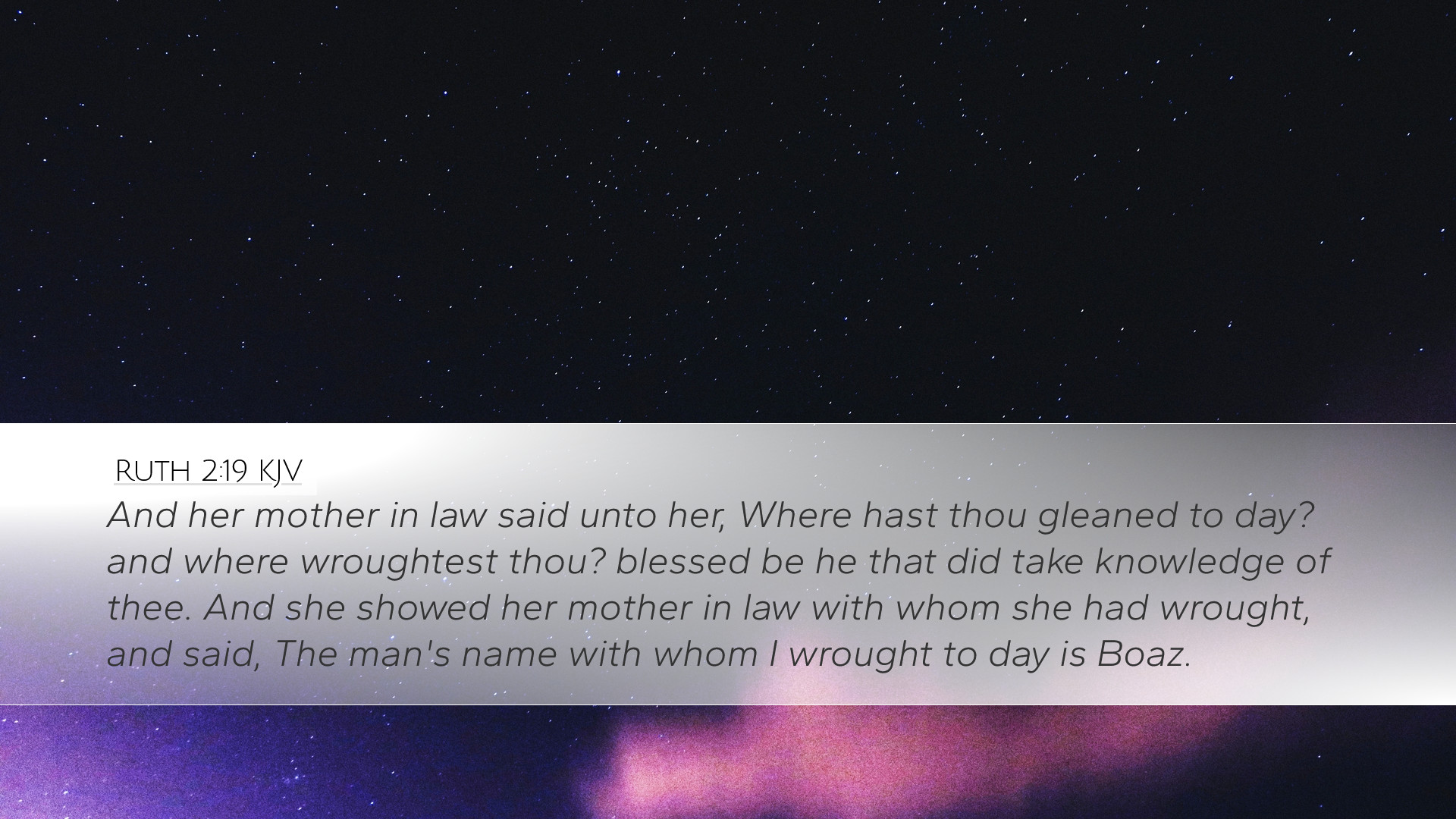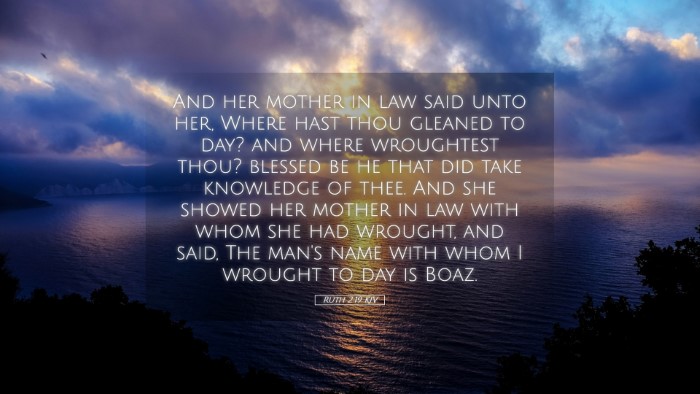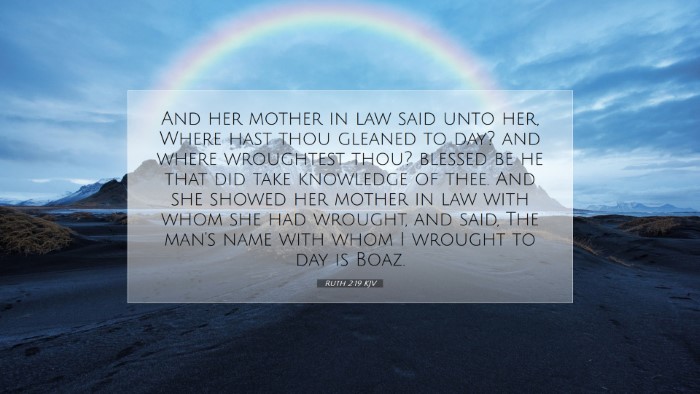Old Testament
Genesis Exodus Leviticus Numbers Deuteronomy Joshua Judges Ruth 1 Samuel 2 Samuel 1 Kings 2 Kings 1 Chronicles 2 Chronicles Ezra Nehemiah Esther Job Psalms Proverbs Ecclesiastes Song of Solomon Isaiah Jeremiah Lamentations Ezekiel Daniel Hosea Joel Amos Obadiah Jonah Micah Nahum Habakkuk Zephaniah Haggai Zechariah MalachiRuth 2:19
Ruth 2:19 KJV
And her mother in law said unto her, Where hast thou gleaned to day? and where wroughtest thou? blessed be he that did take knowledge of thee. And she showed her mother in law with whom she had wrought, and said, The man's name with whom I wrought to day is Boaz.
Ruth 2:19 Bible Commentary
Ruth 2:19 - Comprehensive Bible Commentary
Verse: Ruth 2:19 - "And her mother-in-law said unto her, Where hast thou gleaned today? and where wroughtest thou? Blessed be he that did take knowledge of thee. And she told her mother-in-law with whom she had wrought, and said, The man's name with whom I wrought to day is Boaz."
Introduction
The Book of Ruth is a poignant narrative highlighting themes of loyalty, kindness, and divine providence. The verse in focus, Ruth 2:19, showcases a critical moment in the story where Ruth’s efforts in gleaning attract the attention of her mother-in-law Naomi, leading to deepening insights into God's provision and the unfolding of His redemptive plan.
Contextual Analysis
Ruth, a Moabite widow, had chosen to stay with her mother-in-law, Naomi, after the death of her husband. This moment in Chapter 2 is particularly significant as it marks Ruth's integration into the social fabric of Israelite society through her work in the fields. The cultural backdrop of gleaning—allowing the poor to collect leftover grain—speaks to the laws established in Levitical texts, demonstrating both justice and provision for the needy.
Insights from Matthew Henry
Matthew Henry interprets this verse by emphasizing the joy and curiosity of Naomi upon learning of Ruth's successful gleaning. He notes how the question, "Where hast thou gleaned today?" reflects a deeper yearning for her daughter-in-law’s well-being. Henry points out the divine hand at work in Boaz's interest, illustrating God's providence and readiness to bless those who seek refuge under His wings.
Insights from Albert Barnes
Albert Barnes provides additional insight into Naomi's reaction. He highlights the blessing upon Boaz and the communal recognition of his graciousness. According to Barnes, this moment foreshadows the providential relationships that unfold in the narrative, emphasizing that Ruth's humble work is seen and honored. It underscores the principle of reward for diligence and the recognition that God’s favor often comes through human channels.
Insights from Adam Clarke
Adam Clarke focuses on the importance of relationships and identity in this scenario. He notes that Ruth's mention of Boaz signifies a pivotal point in her journey, acknowledging a named individual who plays a role in her life. Clarke reflects upon the notion of blessing attributed to Boaz, suggesting that it demonstrates the importance of social connections and benevolent actions in communal life, and how they reflect God's overarching plan of redemption.
Thematic Explorations
- Divine Providence: Each character's actions demonstrate how God orchestrates events for the good of His people. Ruth's gleaning and Boaz's kindness act as catalysts for God’s plan.
- Social Justice: The act of gleaning itself highlights God’s commands for caring for the marginalized, bringing to the forefront the importance of social responsibility.
- Family and Loyalty: Ruth's dedication to Naomi showcases loyalty and familial bonds, reinforcing the idea of covenant faithfulness amid hardships.
Practical Applications
This verse can inspire pastors and theologians in their teachings about God’s providence and the value of human efforts in fulfilling divine intentions. It encourages believers to take notice of the ways God may be working through ordinary circumstances. Here are some key applications:
- Encouragement to the diligent: Like Ruth, believers are called to be industrious in their endeavors, trusting that God sees and rewards their efforts.
- Calling for communal support: The interaction between Ruth and Naomi encourages communities to cultivate relationships that foster support and encouragement.
- Awareness of God's provision: Recognizing God's hand in everyday occurrences reminds believers of His constant presence and care.
Conclusion
Ruth 2:19 serves as a point of reflection on how God intricately weaves the lives of His people together through acts of kindness and diligence. The insights of Matthew Henry, Albert Barnes, and Adam Clarke weave a rich tapestry of understanding that speaks to the heart of God’s nature as a provider and redeemer. In light of this verse, believers are invited to discern the workings of God in their own lives and to recognize the blessings that come through faithfulness and community.


